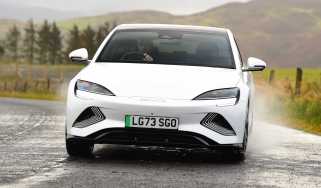Labour are leaving car drivers on the hard shoulder
Editor Paul Barker thinks it’s worrying that transport secretary Louise Haigh ignored drivers at the Labour Party conference

Last week’s speech to the Labour Party conference by transport secretary Louise Haigh was notable for what wasn’t there, more than what was. A year ago as shadow transport secretary, she promised action on “rip-off prices at the petrol pump” and a crackdown on “unfair car insurance fees hitting people hard”. But a year on and now in power, the minister in charge of the UK’s roads left drivers on the hard shoulder in her conference speech.
Yes, there was some good stuff that, if it comes to fruition, has the potential to help reduce congestion by getting public transport working, but it was some cause for concern that the nation’s drivers didn’t even get a passing mention. Although I’m sure drivers won’t be ignored at the end of this month, when chancellor Rachel Reeves delivers the new Labour government’s first Budget statement…
The nearest we got to addressing drivers’ concerns were throwaway lines about getting Britain moving, with references to young people who can’t afford car insurance or get a driving-test slot, and businesses that want to invest but can’t get their people or produce where they want them to be. But no hint about any actual action. The new motto to “move fast and fix things” is all well and good, but potholes, congestion, parking fines and charges, escalating insurance costs and the UK’s electric vehicle charging network are a small selection of things that could do with some fast moves and varying degrees of fixing.
I’d wholeheartedly agree that the UK’s railway network isn’t in great shape and is very expensive to use. There would also be big benefits if local buses were more frequent and reliable, but addressing those issues should go hand-in-hand with ideas to make life better for the tens of millions of people who rely on cars.
Cursory mentions of driving test queues or young people not being able to afford car insurance (it’s not just young people struggling with rising costs) aren’t enough. Especially when they’re accompanied by calling time on the “culture wars around walking and cycling”, which sounds ominous for motorists. Better buses and trains plus more walking and cycling would be good news for everyone, but a rounded transport policy needs to include a road to better things for drivers, too.
Do you agree with Paul? Let us know your thoughs in the comments section...
Find a car with the experts




